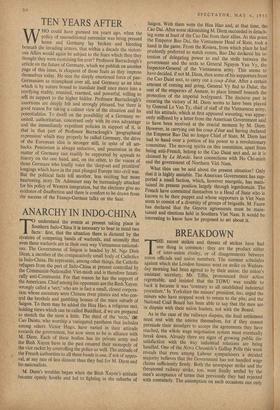TEN YEARS AFTER
WHO could have guessed ten years ago, when the policy of unconditional surrender was being pressed home and Gertnany lay broken and bleeding beneath the invading armies, that within a decade the victori- ous Allies would again be subject to the fears which then they thought they were exorcising for ever? Professor Barraclough's article on the future of Germany, which we publish on another page of this issue, is eloquent of those fears as they impress themselves today. He sees the deeply emotional force of pan- Germanism as triumphant over all, and Germany as an idea which is by nature bound to translate itself once more into a terrifying reality, reunited, rearmed, and powerful, willing to set its support to the higher bidder. Professor Barraclough's assertions are deeply felt and strongly phrased, but there is good reason for taking a calmer view of the situation and its potentialities. To dwell on the possibility of a Germany re- united, authoritarian, concerned only with its own advantage and the immediately expedient policies in support of it, is that in that part of Professor Barraclough's 'geographical expression' whith may properly be called Germany, the drive of the European idea is stronger still, in spite of all set- backs. Pessimism is always seductive, and pessimism in the matter of Germany can, readily be supported by appeals to history on the one hand, and, on the other, to the voices of those Germans who loudly voice the 'deep-set and primitive' longings which have in the past plunged Europe into civil war. But the political facts tell another, less exciting but more heartening. story. Dr. Adenauer may be increasingly attacked for his policy of Western integration, but the elections give no evidence of disaffection and there is comfort to be drawn from the success of the FranT-German talks on the Saar.










































 Previous page
Previous page